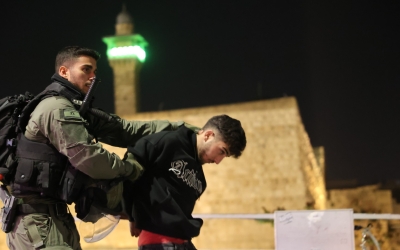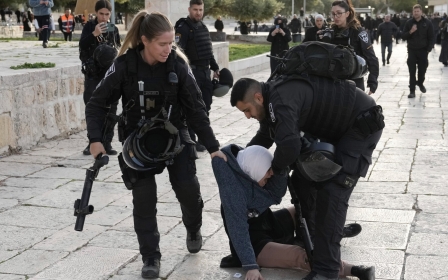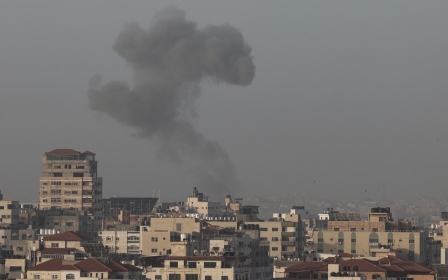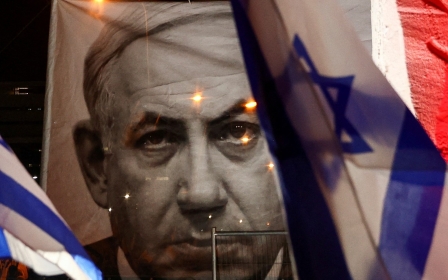Al-Aqsa raid: Arab countries condemn 'extremist' Israeli attack on worshippers
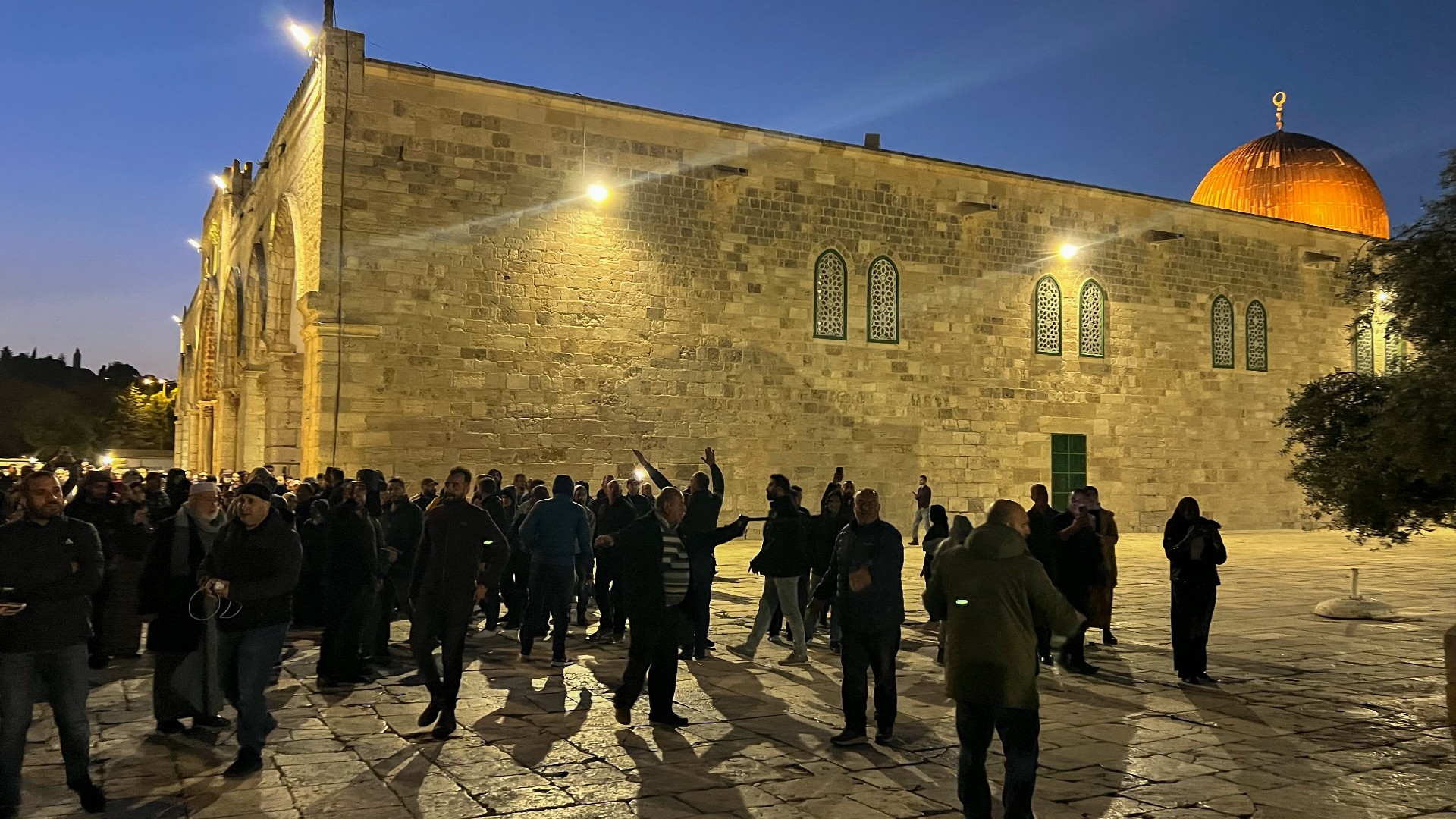
The brutal attack by Israeli forces on Palestinian worshippers at Al-Aqsa Mosque in occupied East Jerusalem has been strongly denounced by Arab countries, and has raised questions about the prospects for further normalisation of ties with Israel.
Dozens of heavily armed officers stormed the site late on Tuesday night, using stun grenades and firing teargas into Al-Qibli prayer hall, where hundreds of men, women, elderly people and children were staying overnight to pray.
Officers beat worshippers with batons and riot guns, wounding many, before arresting them. Some eyewitnesses said rubber-coated steel bullets were also fired.
The Arab League condemned the attack and warned of an ensuing escalation.
"The extremist approaches that control the policy of the Israeli government will lead to widespread confrontations with the Palestinians if they are not put to an end," Arab League Secretary-General Ahmed Aboul Gheit said in a statement.
New MEE newsletter: Jerusalem Dispatch
Sign up to get the latest insights and analysis on Israel-Palestine, alongside Turkey Unpacked and other MEE newsletters
The League said it would hold a meeting on Wednesday afternoon, after Jordan called for an emergency meeting in coordination with Palestinian and Egyptian officials.
Jordan's foreign ministry said Arab efforts were ongoing to stop "Israeli violations that are a flagrant violation of international humanitarian law", adding that such practices aimed to "alter the historical and legal status of Jerusalem".
Saudi Arabia condemned the "blatant" attacks on worshippers, and said it was following events at Al-Aqsa with "great concern".
"Saudi Arabia condemns this blatant storming and expresses its rejection of these practices that undermine peace efforts and contradict international principles in respect of religious sanctities," Riyadh's foreign affairs ministry said in a statement.
'These brutal criminal practices [are] a serious escalation and a blatant infringement of the holy places, an extension of the policy of Judaising Jerusalem'
- Qatar statement
It added that it supported efforts aimed at "ending the occupation and reaching a just and comprehensive solution to the Palestinian cause".
Qatar said it considered "these brutal criminal practices a serious escalation and a blatant infringement of the holy places, an extension of the policy of Judaising Jerusalem, [and] a violation of international law and resolutions of international legitimacy".
Doha described the attacks as "a provocation to the feelings of more than two billion Muslims in the world, especially in the blessed month of Ramadan".
Meanwhile, Egypt said it held "the occupying power responsible for this dangerous escalation, which could undermine the truce efforts in which Egypt is engaged with its regional and international partners".
Normalisation under threat
Israeli Prime Minister Benjamin Netanyahu said on Wednesday that Israel was working to calm the situation in Al-Aqsa.
"Israel is committed to maintaining freedom of worship, free access to all religions and the status quo, and will not allow violent extremists to change that," he said in a statement.
However, the latest attacks - among other recent escalations in Israeli violence - could impact Israel's efforts to maintain and build ties with Arab nations.
In 2020, Israel established diplomatic relations with the United Arab Emirates, Bahrain, Morocco and Sudan as part of the so-called Abraham Accords brokered by former US President Donald Trump.
Palestinians have denounced the agreements, which they say violate a longstanding Arab League position that relations with Israel should only be normalised in exchange for a Palestinian state.
The UAE last month condemned Israeli Finance Minister Bezalel Smotrich for denying the existence of Palestinian people.
Earlier this year, the Emiratis also denounced a provocative visit by far-right National Security Minister Itamar Ben-Gvir to Al-Aqsa, which reportedly resulted in Netanyahu's visit to the UAE being cancelled.
Israeli abuses against Palestinians have continued despite occasional condemnations from countries with whom it has strengthened ties, and some have suggested the process of normalisation could grind to a halt.
"The Abraham Accords are dead in having any possible positive tangible outcomes for Palestinians," Andreas Krieg, assistant professor at the Defence Studies Department of King's College London, told Middle East Eye.
"The key problem [is] that there isn't any conditionality put upon Israel that would punish [it] for bad conduct.
"Everything we've seen over the last couple of weeks, particularly since the pogrom in Huwwara and other very vile, one-sided escalations from Israel against Palestinians, despite all this… nothing has actually changed."
Robert Mason, a researcher on Gulf foreign policy, told MEE: "Beyond condemnation and cancelled visits, it is likely the fallout from such incidents on the [Abraham] Accords will be limited."
'The Abraham Accords are dead in having any possible positive tangible outcomes for Palestinians'
- Andreas Krieg, analyst
Israel has expressed its ambition to continue signing normalisation deals with Arab nations, and is particularly hopeful in persuading Saudi Arabia.
Riyadh has maintained it will not normalise ties until Palestinians are granted statehood.
Krieg said that for the likes of Saudi Arabia, Kuwait and Qatar to consider strengthening ties with Israel, a new initiative would be necessary outside the framework of existing normalisation deals, which committed to a two-state solution.
"The Israelis would have to make a meaningful step towards peace in Palestine, a meaningful step not just in stopping the building of settlements, but also withdrawing from [them]," he said.
"That is absolutely not happening. Israel is becoming a more and more authoritarian democracy, run by fascists and ultra-radical fundamentalists."
Saudi red lines
Meanwhile, Mason said that Saudi red lines on normalisation had already been drawn in the Arab Peace Initiative, and it would be "difficult to walk those back".
The initiative, first endorsed by the Arab League in 2002, offers normalisation in return for Israeli withdrawal from occupied territory, a "just settlement" for Palestinian refugees and a Palestinian state with East Jerusalem as its capital.
"Further normalisation is likely to contribute to more intransigence (at least under this Israeli government) and further Palestinian attempts to make their voice heard," added Mason.
Feras Abu Helal, columnist and editor of the Arab21 news site, told MEE he believed condemnations of the attacks at Al-Aqsa were insufficient without further action.
"Israel will not be held to account unless Arab states take practical actions, such as sacking its ambassadors, stopping public and secret trade and security deals, and presenting real support to Palestinians financially and diplomatically," he said. "Unfortunately, such actions are not expected."
Middle East Eye delivers independent and unrivalled coverage and analysis of the Middle East, North Africa and beyond. To learn more about republishing this content and the associated fees, please fill out this form. More about MEE can be found here.


